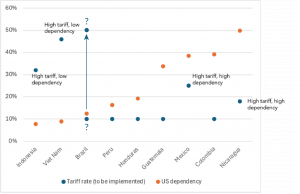
New report warns Trump’s 50 % tariff plan could devastate coffee-growing economies and raise prices for U.S. consumers
A New Coffee Watch Report Warns Tariff Wars Deepen Inequality for Millions of Coffee Farmers and Could Make Coffee Consumers Pay More
WASHINGTON D.C., DC, UNITED STATES, July 22, 2025 /EINPresswire.com/ -- A new Coffee Watch report finds that global coffee tariffs already funnel wealth away from producer nations, and U.S. President Donald Trump’s escalating trade war threatens to make the crisis far worse.The administration has imposed a 10% duty on all green-coffee imports and is now preparing a 50% tariff on beans from Brazil, the world’s largest producer, along with additional levies on Mexico, Vietnam, and others.
With many farmers and farmworkers already below the extreme poverty line, set by the World Bank at $2.15 a day, increased tariffs on coffee will push millions deeper into crisis.
“This is not only about coffee. This is about justice,” said Etelle Higonnet, Director of Coffee Watch. “Trump’s tariff wars will be a poverty multiplier for coffee-growing countries. Tariffs already have brought many farming communities to the brink of disaster, but Trump’s tariff wars threaten to collapse entire rural economies from Chiapas to Minas Gerais and beyond. Coffee has 25 million farmers and 100 million farmworkers, that’s millions of lives poised to suffer because of the whims of a U.S. president who uses tariffs as his own personal protection racket. And, by the way, he doesn’t even drink coffee.”
Key findings
- Tariff shock: After decades of tariff-free imports, the United States now charges 10% on all green coffee—with a 50% rate proposed for Brazil and higher duties pending for Mexico, Vietnam, Colombia, and others.
- High dependency: Mexico exports 39% of its coffee to the U.S.; Nicaragua sends 50%. Such countries face “devastating” losses that could push farmers into extreme poverty.
- Unequal value chain: Producer nations grow 74% of the world’s export volume but receive only 57% of the total value. Almost 99% of their coffee exports remain raw, low-value beans because wealthy nations impose steep duties on roasted or decaffeinated coffee.
- Poverty line: Many farmers already live below the World Bank’s extreme-poverty threshold of US $2.15/day; new U.S. tariffs would deepen the crisis.
A global system rigged against producers
Roasting and decaffeinating, the steps that add most value, take place almost entirely in consuming countries, especially in Europe, where tariffs on processed coffee are among the world’s highest.
“Coffee-producing countries grow the crop and bear the risks, yet they’re locked out of the real profits by a system that benefits the Global North,” Higonnet said. “The world can’t claim to love coffee while turning a blind eye to the exploitation that fuels it.”
Examples of fairer trade
Nations such as Australia, Canada, and Norway apply zero tariffs on roasted or otherwise processed coffee from origin countries, which is proof that equitable trade rules are possible.
“Tariff reform is not just good policy,” Higonnet concluded. “It’s key for the future of coffee.”
For interviews, data requests, or to speak with the authors, please contact
info@coffeewatch.org | www.coffeewatch.org
Etelle Higonnet
Coffee Watch
email us here
Visit us on social media:
LinkedIn
Bluesky
Instagram
Facebook
YouTube
X
Distribution channels: Agriculture, Farming & Forestry Industry, Business & Economy, Food & Beverage Industry, U.S. Politics, World & Regional
Legal Disclaimer:
EIN Presswire provides this news content "as is" without warranty of any kind. We do not accept any responsibility or liability for the accuracy, content, images, videos, licenses, completeness, legality, or reliability of the information contained in this article. If you have any complaints or copyright issues related to this article, kindly contact the author above.
Submit your press release
